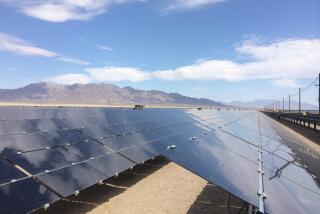The Power to Change the World
- Share via
For years, experts have been saying we have only 40 or so years of cheap, available crude oil left. Now some of the world’s leading petroleum geologists are suggesting that global oil production could peak and begin a steep decline as early as the end of this decade, sending oil prices through the roof. Increasing tensions between the West and Islamic countries, where most of the world’s oil is produced, could further threaten our access to affordable oil.
In desperation, the United States and other nations could turn increasingly to dirtier fossil fuels--coal, tar sand and heavy oil--which would only worsen global warming and imperil the Earth’s already beleaguered ecosystems.
There is a better way to go: hydrogen power.
Weaning the world off oil and turning it toward hydrogen, however, will require a concerted effort by industry, government and local communities on a scale comparable to the efforts in the 1980s and 1990s that helped create the World Wide Web.
Hydrogen is the most basic and ubiquitous element in the universe. It is the “forever fuel,” producing no harmful carbon dioxide emissions when burned and giving off as byproducts only heat and pure water. All that needs to be done is to extract hydrogen from various elements so that it is useable in fuel cells.
The commercially usable hydrogen currently being produced is extracted mostly from natural gas. However, renewable sources of energy--wind, hydro, photovoltaic, geothermal, biomass--are increasingly being used to generate electricity locally, and in the future that electricity will in turn be used to electrolyze water and separate out hydrogen that can be used to power fuel cells.
Commercial fuel cells powered by hydrogen are just now being introduced into the market for home, office and industrial use. The major auto makers have spent more than $2 billion on development of hydrogen cars, buses and trucks; the first mass-produced vehicles are expected to be on the road in just a few years.
Exactly how soon we will all be driving hydrogen cars will depend on a number of factors, including the price of oil on world markets, the availability of hydrogen refueling stations and numerous other technical questions in the manufacturing process itself.
Even given these stumbling blocks, many energy experts believe that over the next several decades hydrogen fuel cells will become our best source of energy. And the rise of this source of power would open the way for fundamental changes in our markets and political and social institutions, just as coal and steam power did at the beginning of the Industrial Age.
The hydrogen economy would make possible a vast redistribution of power. Today’s centralized, top-down flow of energy, controlled by global oil companies and utilities, would become obsolete. In the new era, every human being could become the producer as well as the consumer of his or her own energy--so-called “distributed generation.”
When millions of users connect their fuel cells by hooking into existing power grids, using the same design principles and smart technologies that made possible the Web, they can begin to share energy peer-to-peer--creating a new, decentralized form of energy use.
In the hydrogen fuel cell era, even the automobile itself would be a “power station on wheels” with a generating capacity of 20 kilowatts. Since the average car is parked most of the time, it could be plugged in, during nonuse hours, to the home, office or the main interactive electricity network, providing premium electricity back to the grid.
When the end users also become the producers of their energy, the only role remaining for existing power plants is to become “virtual power plants” that can manufacture and market fuel cells, bundle energy services and coordinate the flow of energy over the existing power grids.
Hydrogen would dramatically cut down on carbon dioxide emissions and mitigate the effects of global warming. And because hydrogen is so plentiful and exists everywhere, every human being, once we all become masters of the technology, could be “empowered,” resulting in the first truly democratic energy regime in history.
Nowhere would hydrogen energy be more important than in the developing world.
Incredibly, 65% of the human population has never made a single telephone call, and one-third has no access to electricity or any other form of commercial energy.
Lack of access to energy, especially electricity, is a key factor in perpetuating poverty around the world.
Conversely, access to energy means more economic opportunity. In South Africa, for example, for every 100 households electrified, 10 to 20 new businesses are created.
Electricity frees human labor from day-to-day survival tasks. In resource-poor countries, simply finding enough firewood or dung to warm a house or cook meals can take hours out of each day.
Electricity provides power to run farm equipment, operate small factories and craft shops and light homes, schools and businesses.
As the price of hydrogen fuel cells and accompanying appliances plummets with new innovations and economies of scale, cells will become more available, as was the case with transistor radios, computers and cellular phones. The goal ought to be to provide stationary fuel cells for every neighborhood and village in the developing world.
The road to global security lies in lessening our dependence on Middle East oil and making sure that all people on Earth have access to the energy they need to sustain life. The hydrogen economy is a promissory note for a safer world.
*
Jeremy Rifkin is the author of “The Hydrogen Economy: The Creation of the World Wide Energy Web and the Redistribution of Power on Earth” (Tarcher/Putnam, 2002).
More to Read
Inside the business of entertainment
The Wide Shot brings you news, analysis and insights on everything from streaming wars to production — and what it all means for the future.
You may occasionally receive promotional content from the Los Angeles Times.










